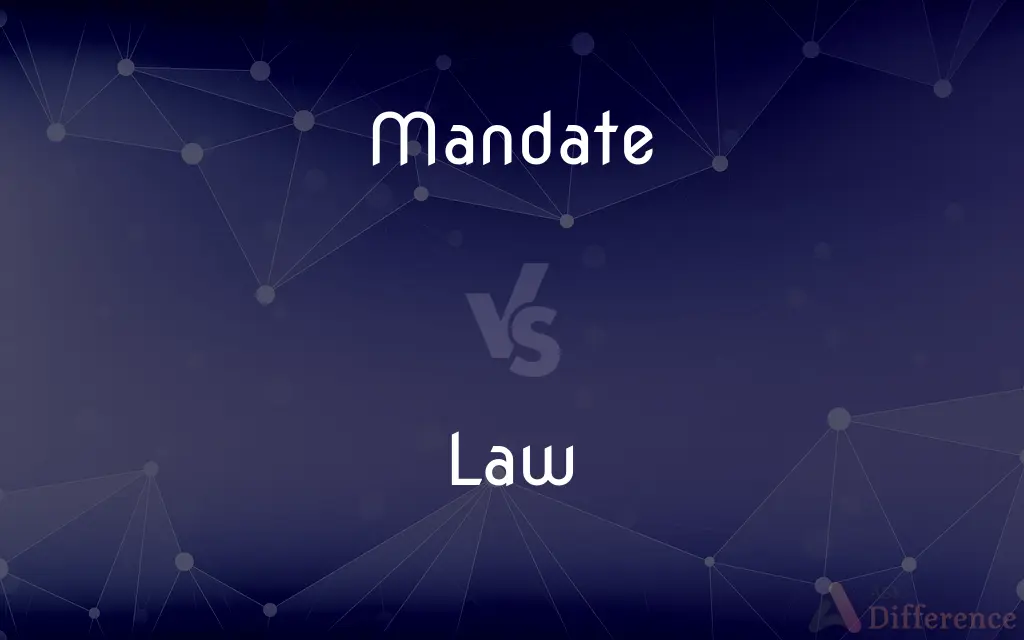Mandate vs. Law — What's the Difference?
Edited by Tayyaba Rehman — By Fiza Rafique — Updated on October 31, 2023
A mandate is an official order or commission to do something, while a law is a system of rules recognized by a country or community.

Difference Between Mandate and Law
Table of Contents
ADVERTISEMENT
Key Differences
A mandate often refers to an authoritative command or instruction, typically from a higher authority. In contrast, a law is a rule or set of rules established and enforced by the governing body of a society.
While a mandate might be specific to certain situations or periods, a law generally has a broader and more permanent application within the jurisdiction it's established.
A mandate may be issued without legislative processes, possibly as an executive decision. On the other hand, a law typically goes through formal legislative procedures before it's enacted.
Mandates can be temporary, responding to specific circumstances (like health emergencies). Laws, while they can be changed or repealed, are generally designed for longer-term governance.
Mandates might not carry legal penalties if not followed, though they can be enforced by related institutions. Laws have clear legal consequences for violations.
ADVERTISEMENT
Comparison Chart
Nature
Authoritative command
Rule or set of rules
Duration
Can be temporary
Generally long-term
Origin
May be issued by higher authorities without legislative processes
Goes through legislative procedures
Enforcement
Might not have legal penalties
Has legal consequences for violations
Scope
Specific to situations or periods
Broad and more permanent
Compare with Definitions
Mandate
Authority granted to act in a certain way.
The election results gave him a clear mandate to implement the policies.
Law
A system of rules recognized by a country or community.
Breaking the law can result in penalties or imprisonment.
Mandate
An official order or commission to do something.
The president issued a mandate to wear masks in federal buildings.
Law
A principle or regulation governing actions and procedures.
The law of gravity explains the attraction between masses.
Mandate
A requirement to carry out a particular policy.
The organization has a mandate to promote environmental sustainability.
Law
Law is a system of rules created and enforced through social or governmental institutions to regulate behavior, with its precise definition a matter of longstanding debate. It has been variously described as a science and the art of justice.
Mandate
An authoritative command or instruction.
Law
A rule of conduct or procedure established by custom, agreement, or authority.
Mandate
A command or authorization given by a political electorate to the winner of an election.
Law
The body of rules and principles governing the affairs of a community and enforced by a political authority; a legal system
International law.
Mandate
A commission from the League of Nations authorizing a member nation to administer a territory.
Law
The condition of social order and justice created by adherence to such a system
A breakdown of law and civilized behavior.
Mandate
A region under such administration.
Law
A set of rules or principles dealing with a specific area of a legal system
Tax law.
Criminal law.
Mandate
(Law) The specific directive issued by a reviewing court to a lower court, as in requiring the lower court to enter a new judgment or to conduct further proceedings consistent with the reviewing court's ruling.
Law
A statute, ordinance, or other rule enacted by a legislature.
Mandate
To assign (a colony or territory) to a specified nation under a mandate of the League of Nations.
Law
A judicially established legal requirement; a precedent.
Mandate
To make mandatory, as by law; decree or require
Mandated desegregation of public schools.
Law
The system of judicial administration giving effect to the laws of a community
All citizens are equal before the law.
Mandate
An official or authoritative command; an order or injunction; a commission; a judicial precept; an authorization.
Law
Legal action or proceedings; litigation
Submit a dispute to law.
Mandate
(politics) The order or authority to do something, as granted to a politician by the electorate.
Law
An impromptu or extralegal system of justice substituted for established judicial procedure
Frontier law.
Mandate
(Canada) A period during which a government is in power.
Law
An agency or agent responsible for enforcing the law. Often used with the
"The law ... stormed out of the woods as the vessel was being relieved of her cargo" (Sid Moody).
Mandate
(historical) An order by the League of Nations to a member nation to establish a government responsible for a conquered territory, as the colonies of Germany after World War I.
Law
(Informal) A police officer. Often used with the.
Mandate
(historical) Such a territory.
Law
The science and study of law; jurisprudence.
Mandate
(uncommon) man date: a date between two men.
Law
Knowledge of law.
Mandate
To authorize.
Law
The profession of an attorney.
Mandate
To make mandatory.
Law
Something, such as an order or a dictum, having absolute or unquestioned authority
The commander's word was law.
Mandate
An official or authoritative command, order, or authorization from a superior official to a subordinate; an order or injunction; a commission; a judicial precept.
This dream all-powerful Juno; I bearHer mighty mandates, and her words you hear.
Law
A body of principles or precepts held to express the divine will, especially as revealed in the Bible.
Mandate
An authorization to carry out a specific public policy, given by the electorate to their representatives; - it is considered to be implied by the election of a candidate by a significant margin after that candidate has campaigned with that policy as a prominent element of the campaign platform.
Law
The first five books of the Hebrew Scriptures.
Mandate
Authorization by a multinational body to a nation to administer the government and affairs of a territory, usually a former colony; as, termination of the British mandate in Palestine.
Law
A code of principles based on morality, conscience, or nature.
Mandate
A rescript of the pope, commanding an ordinary collator to put the person therein named in possession of the first vacant benefice in his collation.
Law
A rule or custom generally established in a particular domain
The unwritten laws of good sportsmanship.
Mandate
A contract by which one employs another to manage any business for him. By the Roman law, it must have been gratuitous.
Law
A way of life
The law of the jungle.
Mandate
A document giving an official instruction or command
Law
A statement describing a relationship observed to be invariable between or among phenomena for all cases in which the specified conditions are met
The law of gravity.
Mandate
A territory surrendered by Turkey or Germany after World War I and put under the tutelage of some other European power until they ar able to stand by themselves
Law
A generalization based on consistent experience or results
The law of supply and demand.
Mandate
The commission that is given to a government and its policies through an electoral victory
Law
(Mathematics) A general principle or rule that is assumed or that has been proven to hold between expressions.
Mandate
Assign under a mandate;
Mandate a colony
Law
A principle of organization, procedure, or technique
The laws of grammar.
The laws of visual perspective.
Mandate
Make mandatory;
The new director of the schoolbaord mandated regular tests
Law
(usually with "the") The body of binding rules and regulations, customs, and standards established in a community by its legislative and judicial authorities.
The courts interpret the law but should not make it.
In theory, entrapment is against the law.
Mandate
Assign authority to
Law
The body of such rules that pertain to a particular topic.
Property law
Commercial hunting and fishing law
Mandate
A territory transferred by one country to another.
After the war, several regions became mandates under international control.
Law
Common law, as contrasted with equity.
Mandate
A command indicating a desired action.
The committee has a mandate to review all research proposals.
Law
A binding regulation or custom established in a community in this way.
There is a law against importing wallabies.
A new law forbids driving on that road.
The court ruled that the executive order was not law and nullified it.
Law
(more generally) A rule, such as:
Law
Any rule that must or should be obeyed, concerning behaviours and their consequences. mores.}}
"Do unto others as you wish them to do unto you" is a good law to follow.
The law of self-preservation
Law
A rule or principle regarding the construction of language or art.
The laws of playwriting and poetry
Law
A statement (in physics, etc) of an (observed, established) order or sequence or relationship of phenomena which is invariable under certain conditions. theory.}}
The laws of thermodynamics
Newton's third law of motion states that to every action there is always an equal and opposite reaction.
This is one of several laws derived from his general theory expounded in the Philosophiæ Naturalis Principia Mathematica.
Law
A statement (of relation) that is true under specified conditions; a mathematical or logical rule.
Mathematical laws can be proved purely through mathematics, without scientific experimentation.
Law
Any statement of the relation of acts and conditions to their consequences.
The law of scarcity
The law of supply and demand
Law
(linguistics) A sound law; a regular change in the pronunciation of a language.
Grimm's law
Dahl's law
Law
(cricket) One of the official rules of cricket as codified by the its (former) governing body, the MCC.
Law
The control and order brought about by the observance of such rules.
They worked to maintain law and order.
It was a territory without law, marked by violence.
Law
(informal) A person or group that act(s) with authority to uphold such rules and order (for example, one or more police officers).
Here comes the law — run!
Then the law arrived on the scene
Law
The profession that deals with such rules (as lawyers, judges, police officers, etc).
He is studying for a career in law.
She has practiced law in New York for twenty years.
Law
Jurisprudence, the field of knowledge which encompasses these rules.
She went to university to study law.
Law
Litigation; legal action (as a means of maintaining or restoring order, redressing wrongs, etc).
They were quick to go to law.
Law
An allowance of distance or time (a head start) given to a weaker (human or animal) competitor in a race, to make the race more fair.
Law
(aviation) A mode of operation of the flight controls of a fly-by-wire aircraft.
Normal law; alternate law; direct law
Law
(fantasy) One of two metaphysical forces ruling the world in some fantasy settings, also called order, and opposed to chaos.
Law
An oath sworn before a court, especially disclaiming a debt. wager of law", "wage one's law", "perform one's law", "lose one's law".}}
Law
(obsolete) A tumulus of stones.
Law
A hill.
Law
A score; share of expense; legal charge.
Law
(obsolete) To work as a lawyer; to practice law.
Law
To prosecute or sue (someone), to litigate.
Law
(nonstandard) To rule over (with a certain effect) by law; to govern.
Law
(informal) To enforce the law.
Law
To subject to legal restrictions.
Law
(dated) An exclamation of mild surprise; lawks.
Law
In general, a rule of being or of conduct, established by an authority able to enforce its will; a controlling regulation; the mode or order according to which an agent or a power acts.
These are the statutes and judgments and laws, which the Lord made.
The law of thy God, and the law of the King.
As if they would confine the Interminable . . . Who made our laws to bind us, not himself.
His mind his kingdom, and his will his law.
Law
In morals: The will of God as the rule for the disposition and conduct of all responsible beings toward him and toward each other; a rule of living, conformable to righteousness; the rule of action as obligatory on the conscience or moral nature.
Law
The Jewish or Mosaic code, and that part of Scripture where it is written, in distinction from the gospel; hence, also, the Old Testament.
What things soever the law saith, it saith to them who are under the law . . . But now the righteousness of God without the law is manifested, being witnessed by the law and the prophets.
Law
An organic rule, as a constitution or charter, establishing and defining the conditions of the existence of a state or other organized community.
Law
In philosophy and physics: A rule of being, operation, or change, so certain and constant that it is conceived of as imposed by the will of God or by some controlling authority; as, the law of gravitation; the laws of motion; the law heredity; the laws of thought; the laws of cause and effect; law of self-preservation.
Law
In mathematics: The rule according to which anything, as the change of value of a variable, or the value of the terms of a series, proceeds; mode or order of sequence.
Law
In arts, works, games, etc.: The rules of construction, or of procedure, conforming to the conditions of success; a principle, maxim; or usage; as, the laws of poetry, of architecture, of courtesy, or of whist.
Law
Collectively, the whole body of rules relating to one subject, or emanating from one source; - including usually the writings pertaining to them, and judicial proceedings under them; as, divine law; English law; Roman law; the law of real property; insurance law.
Law
Legal science; jurisprudence; the principles of equity; applied justice.
Reason is the life of the law; nay, the common law itself is nothing else but reason.
Law is beneficence acting by rule.
And sovereign Law, that state's collected willO'er thrones and globes elate,Sits empress, crowning good, repressing ill.
Law
Trial by the laws of the land; judicial remedy; litigation; as, to go law.
When every case in law is right.
He found law dear and left it cheap.
Law
An oath, as in the presence of a court.
Law
An exclamation of mild surprise.
Law
Legal document setting forth rules governing a particular kind of activity;
There is a law against kidnapping
Law
The collection of rules imposed by authority;
Civilization presupposes respect for the law
The great problem for jurisprudence to allow freedom while enforcing order
Law
A generalization that describes recurring facts or events in nature;
The laws of thermodynamics
Law
A rule or body of rules of conduct inherent in human nature and essential to or binding upon human society
Law
The learned profession that is mastered by graduate study in a law school and that is responsible for the judicial system;
He studied law at Yale
Law
The force of policemen and officers;
The law came looking for him
Law
The branch of philosophy concerned with the law and the principles that lead courts to make the decisions they do
Law
Legislation or statutes enacted by a governing body.
The new tax law will take effect next year.
Law
A rule describing a consistent relationship in nature.
Mendel's laws of inheritance describe genetic traits' transmission.
Law
A statement of fact deduced from observation.
Boyle's law relates the pressure of a gas to its volume.
Common Curiosities
What does a law represent?
A law represents a rule or set of rules established and enforced by a governing body.
Who enforces laws?
Laws are enforced by designated authorities like the police, courts, or regulatory agencies.
What's the primary purpose of a mandate?
A mandate gives an authoritative command or instruction.
Who usually issues mandates?
Mandates can be issued by higher authorities, governments, or organizations.
Why are mandates important?
Mandates provide guidance, direction, or authoritative instructions, especially during specific situations.
Is a mandate permanent?
Mandates can be temporary and specific to certain situations or periods.
Are laws always permanent?
While laws are designed for longer-term governance, they can be changed or repealed.
How is a mandate different from a directive?
Both convey authoritative instructions, but a mandate often has a broader or more general connotation, while a directive is more specific.
Can mandates have legal consequences?
Some mandates might have legal consequences, but not all do.
Can a mandate turn into a law?
Yes, a mandate can be formalized into law through legislative processes.
How do mandates come into existence?
Mandates may arise from executive decisions, organizational policies, or public consensus.
Why is the rule of law important?
The rule of law ensures that everyone is treated equally, promotes justice, and maintains order in society.
What are the consequences of not following a law?
Violating a law can result in legal penalties, fines, or imprisonment.
Do all countries have the same laws?
No, laws vary from country to country based on their cultural, historical, and political contexts.
Can laws be unjust?
Laws are created by humans, so they can be flawed or unjust and may need reform or repeal.
Share Your Discovery

Previous Comparison
Lynx vs. Tiger
Next Comparison
Process vs. ProgramAuthor Spotlight
Written by
Fiza RafiqueFiza Rafique is a skilled content writer at AskDifference.com, where she meticulously refines and enhances written pieces. Drawing from her vast editorial expertise, Fiza ensures clarity, accuracy, and precision in every article. Passionate about language, she continually seeks to elevate the quality of content for readers worldwide.
Edited by
Tayyaba RehmanTayyaba Rehman is a distinguished writer, currently serving as a primary contributor to askdifference.com. As a researcher in semantics and etymology, Tayyaba's passion for the complexity of languages and their distinctions has found a perfect home on the platform. Tayyaba delves into the intricacies of language, distinguishing between commonly confused words and phrases, thereby providing clarity for readers worldwide.















































